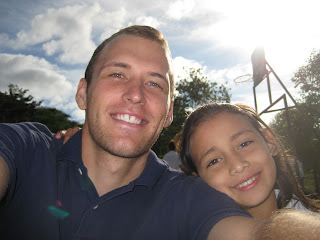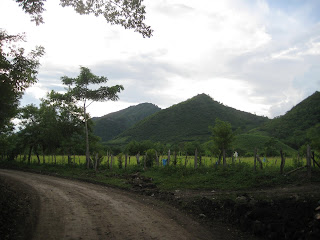Saying goodbye isn’t something I am particularly good at, but I got a lot of practice these past few weeks. We finished exams on Friday November 11th. I was pleasantly surprised with how my kids scored on the final, especially because I made the final excruciatingly long. It was 500 points. Unfortunately, no one reminded me that I would have to grade all of them when they were finished. I had a couple students get a near perfect score.
After the last final exam on Friday there was a going away party at the school where students put on skits, read poems, and made speeches to say bye. I even sang our national anthem. I had to say bye to all the fourth graders on Friday, but I would be seeing the sixth graders since I would attend their graduation into secondary school. The fourth graders were my favorite class. They weren’t a particularly smart class like sixth grade, but I think that is partly my fault. I definitely babied them and I wanted them to have fun above all else. I couldn’t help myself. I just can’t get mad at the younger ones.
The next activity was a going away party for all the teachers at Ricardo’s house. Throughout the year, we didn’t have an excellent relationship with the Honduran teachers. We liked to do business a little differently and at first there was a language barrier keeping us apart. Although we all had some previous Spanish language training, it still took us the majority of the year to get comfortable having a good discussion in Spanish. It is pretty painful for both parties to stumble through conversation on a daily basis. There was good food, awkward games, and we continued to bond with the Honduran teachers.
Our final farewell was graduation. The preschoolers were graduating into primary school and the sixth graders were graduating to secondary school. I felt as though I had 13 children graduating and I was taking pictures like a Japanese tourist. We set up for the graduation the day before and it looked more like a high school prom than a graduation. The attire was more reminiscent of prom than a graduation as well. Latin American women take any opportunity they can to wear tacky dresses and high heels.
I found out that one of my favorite students wasn’t going to attend the ceremony because his family didn’t have the money to pay for it. He was the only one attending because of financial problems. I felt that was unacceptable and I paid his entry into graduation. Each kid chooses “godparents” for graduation and Ramon chose Marie and me. It was an honor to not only watch the graduation, but be involved as a godparent. In addition to my godparent duties, I introduced the sixth grade before they got their diplomas. This made me realize how much I have improved in Spanish. I got up in front of the 150 guests and made a speech. I even had a few jokes thrown in, mostly at my expense.
After the ceremony ended the teachers and a few select family members of students stuck around and of course we had a Latin American dance party. Latin Americans love to dance and they can do it for hours. I think dancing is about the only physical activity they enjoy doing. The teachers all danced together and had a blast. I don’t think it is some sort of phenomenon that we all really started to click as a faculty toward the end. I think in the end you really take inventory of all the good things about a relationship. We all agreed that we should have been hanging out the entire year. Most of the parents and faculty were saying, “Are you sure you can’t stay another year?” I think we all had the same answer. I think we would all love to come back, but we can’t do this forever. You have to let go sometime. It is time for another generation of teachers to come in and enjoy the school.
I think in many ways being a teacher in this environment has taught me a lot about what it means to be a parent. My students really became mine and I got the feeling that I would do anything to make them happy. The kids at the school are so incredibly brave. They see and hear about violence on a daily basis. Most of them don’t have both parents. Some have just one and some don’t have any at all. We taught the best of the best in the town and their family and living conditions still weren’t great.
For as different as they live, the kids here are the same kids in every part of the world. What I like most about teaching elementary school is that the kids are candid. They don’t sugar coat—they’ll tell you if you’re ugly, whether you smell, or whether your clothes suck. You can have the worst kids possible that you absolutely despise in the classroom but miss completely when they are sick for the day.
Last night, I was walking down a dirt road through the center of town and looked around, trying to soak in every ounce of the place I’ve called home this year. Although it was about 75 degrees out, the weather felt chilly because the town was quiet and only the wind whipped through the streets. The town was shrouded in a blanket of deep blue night. I looked up and took a long breath into my belly. The moon shone bright in a sky without stars. I realized something. No matter how different we may seem on the surface, we all walk under the same moon.
So, what next? That is a question I have heard about a million times in the last month as I prepare to go back to the United States
I went through highs and lows during this experience but I am going to take away all positives. My Spanish language skills have sharpened and if I can work with a group of Hondurans, I can pretty much work with anyone. I have been silent for a while on the blog, but I wanted to sum up my trip in one post. Thanks for following!












































